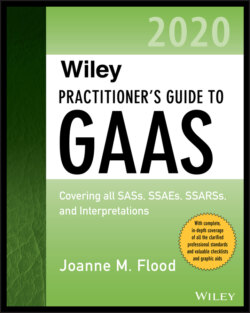Читать книгу Wiley Practitioner's Guide to GAAS 2020 - Joanne M. Flood - Страница 33
Initial Audits, Including Reaudits
ОглавлениеInquiry of the predecessor auditor is required because the predecessor may provide information that will assist the successor auditor in deciding whether to accept the engagement. The communication may be either written or oral. Both the predecessor and successor auditors should treat any information obtained from each other as confidential information. The successor auditor should request permission from the prospective client to make an inquiry of the predecessor prior to final acceptance of the engagement. However, the successor auditor may make a proposal for an audit engagement before having permission to inquire of the predecessor auditor.
The successor auditor should ask the prospective client to authorize the predecessor to respond fully to the successor auditor’s inquiries. If a prospective client refuses to permit the predecessor auditor to respond or limits the response, the successor auditor should inquire as to the reasons and consider the implications of that refusal in deciding whether to accept the engagement. (AU-C 210.11) The successor auditor should make specific and reasonable inquiries of the predecessor about the following four matters:
1 Information about management’s integrity
2 Disagreements with management about accounting principles, auditing procedures, or other significant matters
3 Communications to those charged with governance and responsibility regarding fraud, noncompliance with laws or regulations, and matters related to internal control
4 The predecessor auditor’s understanding of the reasons for the change of auditors
(AU-C 210.A31)
The predecessor auditor should respond promptly, fully, and factually. However, if the predecessor decides, due to unusual circumstances such as impending, threatened, or potential litigation; disciplinary proceedings; or other unusual circumstances, not to respond fully, he or she should indicate that the response is limited. Also, if more than one auditor is considering accepting the audit, the predecessor auditor does not have to respond to inquiries until an auditor has been selected by the entity and has accepted the engagement. Any information exchanged between the predecessor and successor auditors should be considered confidential. (AU-C 210.A28–A.30)
If the successor auditor receives a limited response, that auditor should consider the implications of the limited response in deciding whether to accept the engagement. (AU-C 210.12)
